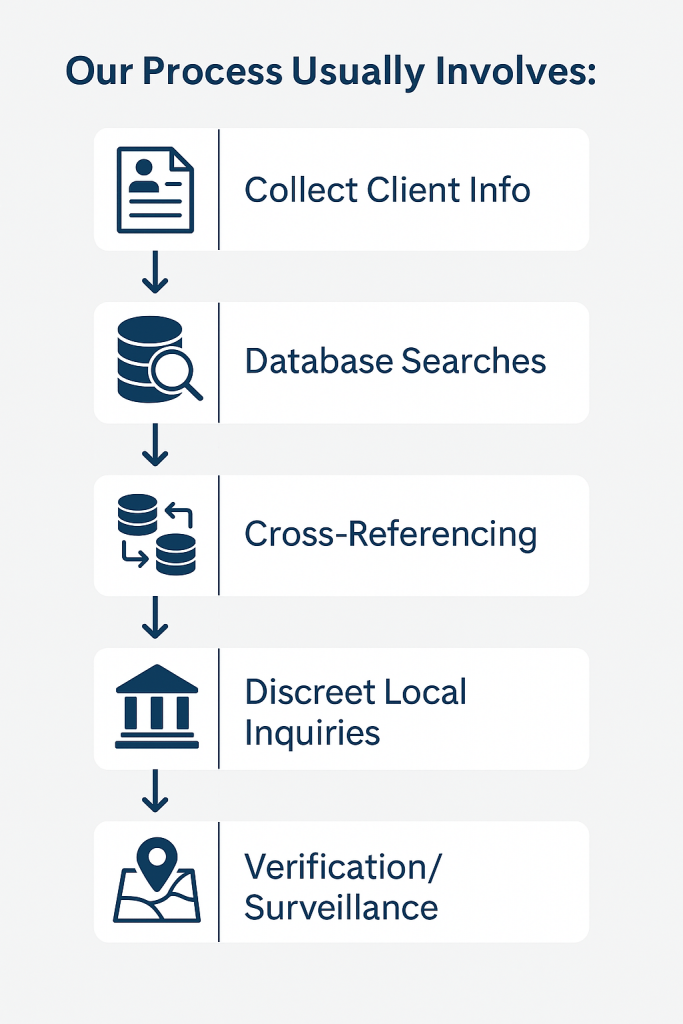Every year, thousands of individuals go missing in Australia, with a significant number of these cases occurring in major cities like Sydney. Whether it’s a long-lost relative or a debtor avoiding legal responsibility, finding someone who has gone missing demands a careful and methodical approach.
As professional private investigators based in Sydney, we rely on a mix of technology and hands-on experience. Our deep local knowledge and strategic methods consistently help us get results.
Below, we break down the most common reasons people go missing, as well as our methods, real case examples, and the legal considerations that guide our work.
Common Reasons for Disappearances in Sydney
People may vanish for a variety of personal, financial, or legal reasons. In Sydney, some of the most common scenarios include:
- Family estrangement or conflict: Individuals distancing themselves from family due to unresolved disputes or personal crises.
- Debt or financial stress: Some go into hiding to avoid creditors or financial obligations.
- Mental health issues: Depression, anxiety, and other mental health conditions can lead to voluntary disappearance.
- Beneficiaries: People entitled to inheritances may not be able to be contacted.
- Legal evasion: Witnesses, defendants, or individuals avoiding legal proceedings.
- Wanderers and vulnerable persons: Elderly individuals with dementia or young people escaping unsafe environments.
Each case is unique. Understanding the “why” behind a disappearance often shapes how we approach the investigation.
Methodologies Employed by Sydney Private Investigators in Tracing Individuals
Locating missing persons in Sydney involves a combination of digital intelligence and on-the-ground techniques.
Core Investigation Methods:
- Public record database searches
- ABN Lookup, White Pages, Ryerson Index, etc
- Used to verify names, addresses, business links, and more.
- Electoral roll examination
- May indicate current address, especially when cross-referenced with other sources.
- Paid subscription databases
- Access to land titles, corporate info, property history, and residential address databases.
- Digital footprint analysis
- Social media activity, online directories, or mentions in forums and websites.
- Effective Google searching
- Advanced search filters (e.g., “John Smith” + Sydney), and contextual clues (e.g. former workplaces or known associates).
- Discreet field inquiries
- Door knocks, neighbour interviews, or subtle checks in key locations.
- Surveillance (when necessary and legal)
- Observational work to confirm presence or activity at an address.
Our Process Usually Involves:
- Gathering all available client information.
- Conducting broad database searches.
- Narrowing the focus through cross-referencing.
- Verifying and validating findings through discreet local inquiries.
- In some cases, confirming address or location via surveillance or third-party confirmation.

Case Studies: Successful Missing Persons Investigations in Sydney
Innumerable missing persons cases come across our desks, but in Sydney, a significant proportion involve debtor tracing. Owing to the city’s strong business culture, it’s common for individuals to disappear after financial disputes. Locating debtors is one of the most common types of missing persons cases we take on. In certain circumstances, our role extends beyond digital searches — we’re required to conduct field surveillance, sometimes tracking individuals from their workplace or public locations in order to confirm their residential address. These cases are often high-stakes and time-sensitive.
One example involved a client who was owed a substantial sum by a former associate who had seemingly dropped off the radar. Our initial searches produced only partial information, but we managed to identify the subject’s current place of work through business registry data and strategic online analysis. From there, we recommended and conducted surveillance to discreetly observe the subject’s movements. This allowed us to follow the subject person home to an unlisted residential address. With this information, the client was able to legally serve the subject, allowing them to initiate legal proceedings and recover the debt.
Legal and Ethical Considerations in Missing Persons Cases
While our role often involves finding people who may not want to be found, every investigation is conducted within the bounds of Australian law. Privacy and ethical standards guide all our work as well.
Key Legal Guidelines We Follow:
- No unlawful surveillance or searches
All inquiries are lawful and in line with relevant privacy laws. - Client obligations
Clients must provide a legitimate purpose for the search (e.g. legal, familial, or financial reasons). - Contractual performance
We are always very clear in terms of what we can endeavour to do because, in any investigation, we are dealing with the unknown and cannot predict the outcome.
Ethical Boundaries:
- We will never engage in harassment or coercion.
- Discretion is paramount — both for our clients and the subjects we investigate.
- Our findings are always reported with transparency and we endeavour to be as accurate as possible.
Need Help Locating Someone in Sydney?
Whether you’re searching for a missing family member, a lost contact, or someone critical to a legal case, our team of licensed Sydney private investigators can help. We combine years of experience with local knowledge and cutting-edge tools to deliver results — ethically, discreetly, and legally.
Contact us today to discuss your case in confidence.



